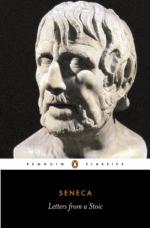
|
| Name: _________________________ | Period: ___________________ |
This test consists of 15 multiple choice questions and 5 short answer questions.
Multiple Choice Questions
1. Why does Seneca say he decided not to commit suicide?
(a) He fell in love with a woman.
(b) For his father's sake.
(c) He was too afraid.
(d) He snapped out of his depression.
2. According to Seneca, what destroyed man's harmonic relationship with nature?
(a) The Iliad.
(b) Greed.
(c) War.
(d) Love.
3. According to Seneca, what is death?
(a) The gateway to Heaven and an opportunity to meet the gods.
(b) An unconscious state of non-existence or a better state than life.
(c) A doorway into a wonderful after life.
(d) Nothing but an unconscious state of non-existence.
4. Which of Seneca's friends grieved the burning of the town discussed in Letter XCI?
(a) Flaccus.
(b) Liberalis.
(c) Lucilius.
(d) Tibius.
5. What happens to Seneca's work ethic and studies once he moves to the country?
(a) He stops all together.
(b) He studies less, but says it really isn't distraction since he is focusing on nature.
(c) They improve.
(d) He finds himself distracted by nature.
6. What becomes of people who live a quiet, private life which incites neither anger nor envy?
(a) They are bored.
(b) They are stoned.
(c) They remain safe.
(d) They accomplish nothing.
7. Who especially does Seneca consider when he makes his move to the country?
(a) His mother.
(b) His wife.
(c) His father.
(d) Himself.
8. According to Seneca, where are the sharpest pains?
(a) In the smallest area of the body.
(b) In the nose.
(c) In the eye/temple area because they are close to the brain.
(d) In the heart.
9. Why does Seneca say he considered suicide once?
(a) Out of consideration for his parents.
(b) To escape his illness.
(c) He didn't feel loved or needed by society.
(d) He felt worthless.
10. What affects Seneca's exercise time according to Letter LXXXIII?
(a) His old age.
(b) His lack of interest.
(c) His lack of time.
(d) The amount of time he studies.
11. For Stoics, what are two basic elements found in any object?
(a) Weight and size.
(b) Sound and fury.
(c) Mass and reason.
(d) Matter and cause.
12. According to his criticism in Letter CVIII, what does Seneca say literary scholars should do with philosophical theories?
(a) Interpret them correctly.
(b) Compare them to other theories.
(c) Write fiction about them that will appeal to the masses.
(d) Apply them to their own lives.
13. What is caused by the flaunting of one's possessions?
(a) Greed.
(b) Happiness.
(c) Bitterness.
(d) Envy.
14. Who does Posidinus credit for the invention for various technological innovations?
(a) Philosophers.
(b) Gods.
(c) Historians.
(d) Mathematicians.
15. What includes the studies of literature, rhetoric and history?
(a) Liberal arts.
(b) Bachelor of arts.
(c) Fine arts.
(d) Still life art.
Short Answer Questions
1. What does Seneca called the past age?
2. Who ran away in Letter CVII that made Lucilius grieve?
3. According to Seneca, what is the fruit of man's own efforts?
4. According to Posidinus, who ruled in the past time?
5. What does Seneca say prepares the mind for philosophy?
|
This section contains 482 words (approx. 2 pages at 300 words per page) |

|




